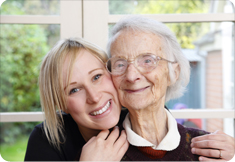DHHS → MeCDC → Environmental and Community Health → EOHP → Heat-related Illness → Who Should Worry about Healt Illness? → Older Adults and Heat Illness
Older Adults (age 65 and older) and Heat Illness
 During very hot weather, the people who are most likely to die or be hospitalized are adults over age 65, especially those who live alone, those without access to air conditioning, and those with underlying health problems.
During very hot weather, the people who are most likely to die or be hospitalized are adults over age 65, especially those who live alone, those without access to air conditioning, and those with underlying health problems.
Why worry about them when it is hot?
- Harder to Adjust: Older adults do not adjust as well as younger people to sudden changes in temperature.
- Thirst: Older adults tend not to feel thirsty and do not feel the need to drink as often as younger people. They may also have a hard time drinking or swallowing.
- Health: An older adult is more likely to have a health issue that makes it hard for the body to cool itself.
- Medications: Older adults are more likely to take medicines like water pills (diuretics) and anti-cholinergics that make it hard for the body to cool itself.
What to do
- Keep cool, drink fluids, lie low
- Use air conditioning to keep cool.
- If you don't have air conditioning spend time in an air-conditioned place like a library, store, senior center, cooling center, or restaurant. If you can't drive yourself, ask a friend, neighbor, or relative to take you.
- Talk with your doctor if you have fluid intake limits or if you take water pills to find out how much fluid you should be drinking on very hot days.
Tips for Caregivers, Family, and Neighbors
- Visit older adults at least 2 times each day. Watch them for signs of heat exhaustion or heat stroke.
- Provide an air conditioner. If there is no air conditioner where they live, get the person to an air-conditioned place like a library, store, senior center, cooling center, or restaurant.
- Electric fans may provide comfort, but when the temperature is hotter than the mid-90s, fans will not prevent heat-related illness. Taking a cool shower or bath, or moving to an air-conditioned place is a much better way to cool off.
- Tell them to drink lots of water or other drinks without caffeine or alcohol even if they are not very active.
- Warning: If their doctor limits the amount of fluid they drink or they are on water pills, they will need to ask their doctor how much they should drink while the weather is hot.
- Make sure their clothing is loose and lightweight.
- Make sure they have access to cool water – a bath, shower, or wet towels can help cool someone down.
More Information
Who else is likely to have serious problems in the heat?

